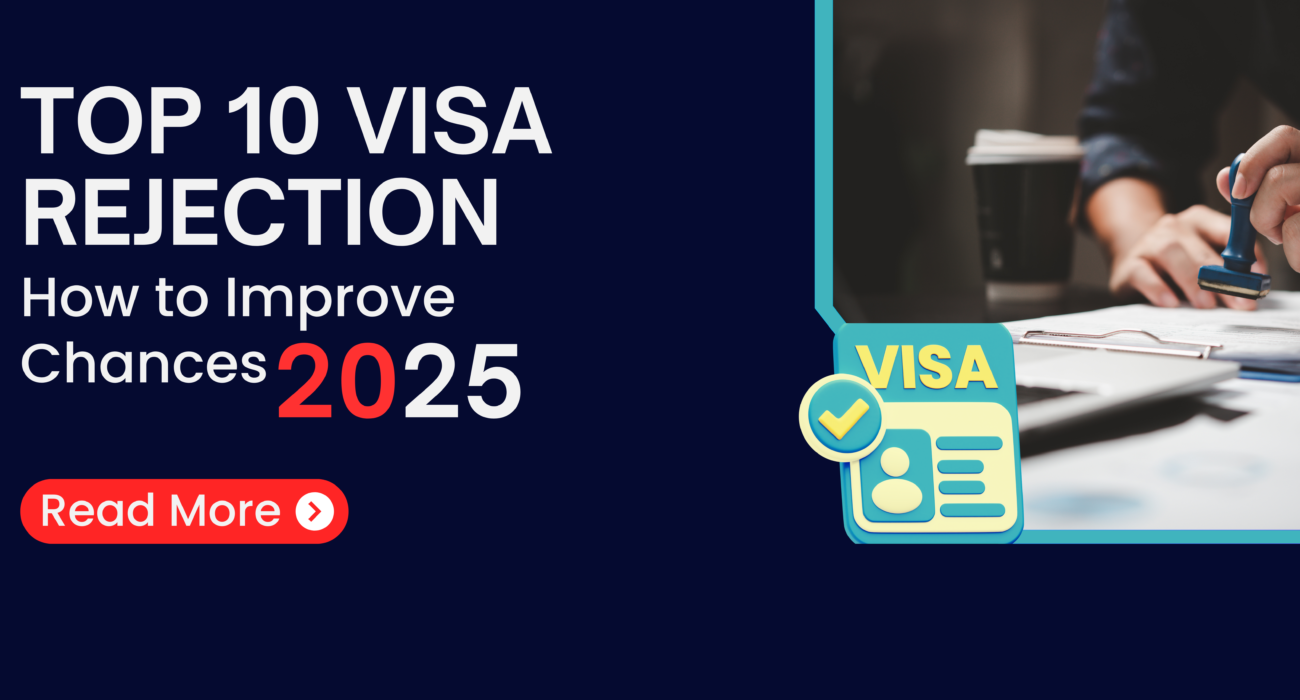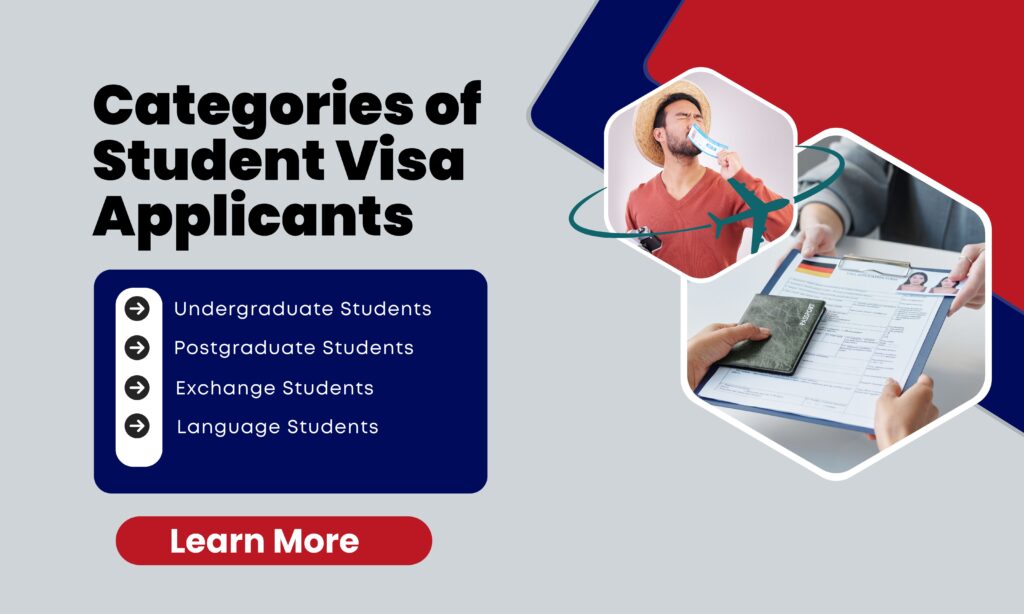When applying for a student visa, it’s crucial to understand the top visa rejection reasons and take steps to avoid them. In 2025, with increasing competition, visa denials are becoming more common. This blog will guide you through the key rejection reasons and provide actionable tips to improve your chances of success.
What are the common visa rejection reasons?
Understanding visa rejection reasons is critical for any student aspiring to study abroad. Rejections not only delay plans but can also lead to financial and emotional stress. Being informed about common pitfalls helps applicants prepare thoroughly. Below are the top 10 visa rejection reasons and how to avoid them:
1. Incomplete Documentation
- One of the most frequent causes of rejection is failing to provide all required documents. This includes missing forms, outdated documents, or improper formatting.
2. Financial Instability
- Visa officers require proof that you can afford tuition, living expenses, and travel costs. Insufficient or ambiguous financial evidence often leads to rejection.
3. Inconsistent Information
- Discrepancies between your application form, passport details, or academic records can raise red flags.
4. Lack of Strong Ties to Home Country
- Applicants must demonstrate a clear intention to return to their home country after studies. Failing to do so may make authorities suspect you intend to overstay.
5. Poor Interview Performance
- The visa interview is a critical step. Nervousness, vague answers, or lack of preparation can leave a negative impression.
6. Inadequate English Proficiency
- The majority of student visas need evidence of English language competency from tests such as the PTE, TOEFL, or IELTS. Rejection may result from scores that fall short of the necessary cutoff.
7. Criminal Record
- A history of criminal activity, no matter how minor, can result in visa denial.
8. Incorrect Visa Category
- Applying for the wrong visa type, such as a tourist visa instead of a Student Visa, often results in rejection.
9. Unrealistic Study Plans
- Choosing a program unrelated to your previous education or career goals may appear suspicious to visa officers.
10. Health Issues
- Most countries require applicants to pass a medical examination. Health conditions that pose risks or fail to meet requirements may lead to rejection.
By understanding these common reasons for visa rejection, you can proactively address potential issues in your application. Remember, meticulous preparation and attention to detail are key to increasing your chances of securing a Student Visa.
How to Improve Your Chances in 2025?
Securing a student visa can be a complex process, but with the right preparation, you can significantly enhance your chances of approval. To help you achieve, consider these doable steps:
1. Thoroughly Research Visa Requirements
Stay updated with the latest visa policies and guidelines for your destination country. Understand the specific requirements for students, including document submission deadlines and eligibility criteria.
2. Submit a Compelling Statement of Purpose (SOP)
Craft an SOP that highlights your academic goals, reasons for choosing your program and university, and how it aligns with your career aspirations. A strong impression on visa officials can be made by a well-written SOP.
3. Secure Academic and Professional Recommendations
Include letters of recommendation from professors or employers to support your application. These can validate your credentials and reinforce your suitability for the chosen program.
4. Stay Organized with Documentation
Maintain a checklist of required documents, such as transcripts, passports, financial proofs, and admission letters. Submitting incomplete or incorrect paperwork can lead to rejection.
5. Highlight Your Career Prospects
Explain how the education you receive will enhance your career opportunities back home. This shows that you are a genuine student and not seeking immigration.
6. Engage with Professional Consultants
Consider consulting with Study Abroad Consultants who can guide you through the process, review your application, and provide expert advice on avoiding common pitfalls.
7. Build a Financial Cushion
Besides meeting the minimum financial requirements, having extra funds can demonstrate your ability to handle unforeseen expenses, increasing your credibility.
8. Double-Check Visa Interview Readiness
Practice answering potential questions about your study plans, finances, and ties to your home country. Clear communication and confidence can make a positive impact.
By following these tips and staying proactive, you can improve your chances of obtaining a student visa in 2025 and begin your journey to studying abroad.
Categories of Student Visa Applicants
When applying for a student visa, it’s crucial to understand the category that aligns with your educational goals. Different categories have unique requirements and processes. Here’s a detailed breakdown:
1. Undergraduate Students
- Who is this for?
Applicants aiming to pursue a Bachelor’s degree in a foreign country. - Requirements:
High school transcripts, proof of admission, standardized test scores (e.g., SAT/ACT), and financial documents to demonstrate your ability to fund your studies.
2. Postgraduate Students
- Who is this for?
Those enrolling in Master’s or Ph.D. programs. - Requirements:
Academic transcripts, degree certificates, letters of recommendation, a statement of purpose, and sometimes research proposals. Financial proof and language proficiency scores (e.g., IELTS, TOEFL) are often mandatory.
3. Exchange Students
- Who is this for?
Individuals participating in short-term academic exchange programs between institutions. - Requirements:
An official letter from the host institution, proof of enrollment in the home institution, and financial documentation. Some programs may require specific insurance coverage.
4. Language Students
- Who is this for?
Students enrolling in language courses, such as English, French, or German, to improve proficiency. - Requirements:
Proof of enrollment in a recognized language school, financial documentation, and a clear plan for post-study activities.
Tips for All Categories
- Understand the Visa Type: Ensure you’re applying for the correct visa type (e.g., F-1 for the USA, Tier 4 for the UK, or Student Visa for Canada).
- Check Documentation: Requirements vary by country and program, so consult the official immigration website of your destination.
- Plan Early: Processing times can vary; start the application process as soon as you receive your admission offer.
Applying under the correct category with the right documentation will increase your chances of visa approval and a smooth transition to your educational journey abroad.
Top Tips to Avoid Visa Rejections

Securing a visa can be a complex process, but careful preparation can help you avoid common pitfalls. Here are some detailed tips to improve your chances of success:
- Research Visa Requirements Thoroughly
Every country has specific visa requirements, and missing even one document can lead to rejection. Take time to review the checklist provided by the embassy or consulate. Use official government websites to verify the most up-to-date information. - Organize Your Documents in Advance
Start gathering your paperwork well before your application deadline. Double-check your forms for accuracy and completeness. Missing signatures, incorrect spellings, or mismatched details can cause unnecessary delays. - Ace the Visa Interview
Many visa applications require an in-person interview. Prepare by practicing common interview questions, such as your reason for travel, ties to your home country, and financial capacity. Maintain a confident and polite demeanor during the session. - Demonstrate Financial Stability
A consistent and credible proof of funds reassures visa officers that you can support yourself during your stay. This includes bank statements, sponsorship letters, or evidence of scholarships. - Stay Informed About 2025 Visa Regulations
Visa rules can change frequently. Subscribe to embassy newsletters or follow trusted immigration blogs to stay updated on the latest policies, especially as 2025 approaches.
By staying organized, informed, and prepared, you can significantly enhance your chances of a successful visa application. Remember, attention to detail is key!
Conclusion & Next Steps
In conclusion, understanding the reasons behind visa rejections is critical for avoiding common mistakes and ensuring a smooth Student Visa application process. By addressing potential weaknesses and preparing thoroughly, you can significantly enhance your chances of success. From presenting strong financial proof to crafting clear and concise answers for your interview, each step plays a vital role in making your application stand out.
Next Steps:
- Double-check Your Documents
Ensure all your paperwork is complete, accurate, and aligned with the requirements of your destination country. Missing or incorrect documentation is a leading cause of visa rejection. - Verify Financial Proof
Review your financial documents to confirm they clearly demonstrate your ability to cover tuition and living expenses. Inadequate proof of funds is another common reason for rejections. - Prepare for Your Visa Interview
Practice answering typical visa interview questions confidently and professionally. Highlight your intent to study and return home after completing your course. - Seek Professional Guidance
Consult with an experienced Study Abroad Consultant to receive tailored advice, review your application, and avoid costly errors. Their expertise can provide invaluable insights into the visa process.
Get Expert Help Today!
For personalized assistance in preparing your Student Visa application, contact Genius Study Abroad for a one-on-one consultation. Let us help you achieve your dream of studying abroad in 2025!
FAQs
1. Which reason is most frequently given for denying a visa?
The most common reason for visa rejection is incomplete documentation or insufficient financial proof. Ensure that you submit all required documents and have enough funds for your stay. Additionally, discrepancies in your application or failure to meet eligibility criteria can also lead to rejection.
2. Can I appeal a visa rejection?
Yes, many countries allow you to appeal a Student Visa rejection. To do this, you’ll need to submit additional documents or provide more information to support your case. It’s crucial to understand the reason for the rejection and address it thoroughly in your appeal.
3. How can I demonstrate a strong sense of national identity?
You can prove ties through job offers, property ownership, family commitments, or enrollment in a program that requires you to return home. These ties demonstrate your intent to return to your home country after completing your studies. Be prepared to explain these ties during your visa interview.
4. How long does the visa process take?
The processing time for a Student Visa can vary by country, but typically it takes 2-4 weeks. Nevertheless, it can take longer during periods of high application. Always apply well in advance to avoid delays and ensure you meet your enrollment deadlines.required
5. Which financial records are necessary in order to obtain a student visa?
Financial documents such as bank statements, proof of scholarship, or sponsorship letters are commonly required. These documents must show that you have sufficient funds to cover tuition fees, living expenses, and travel costs.




